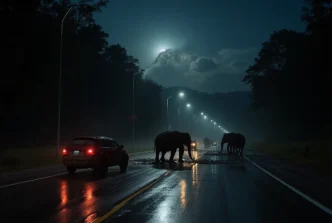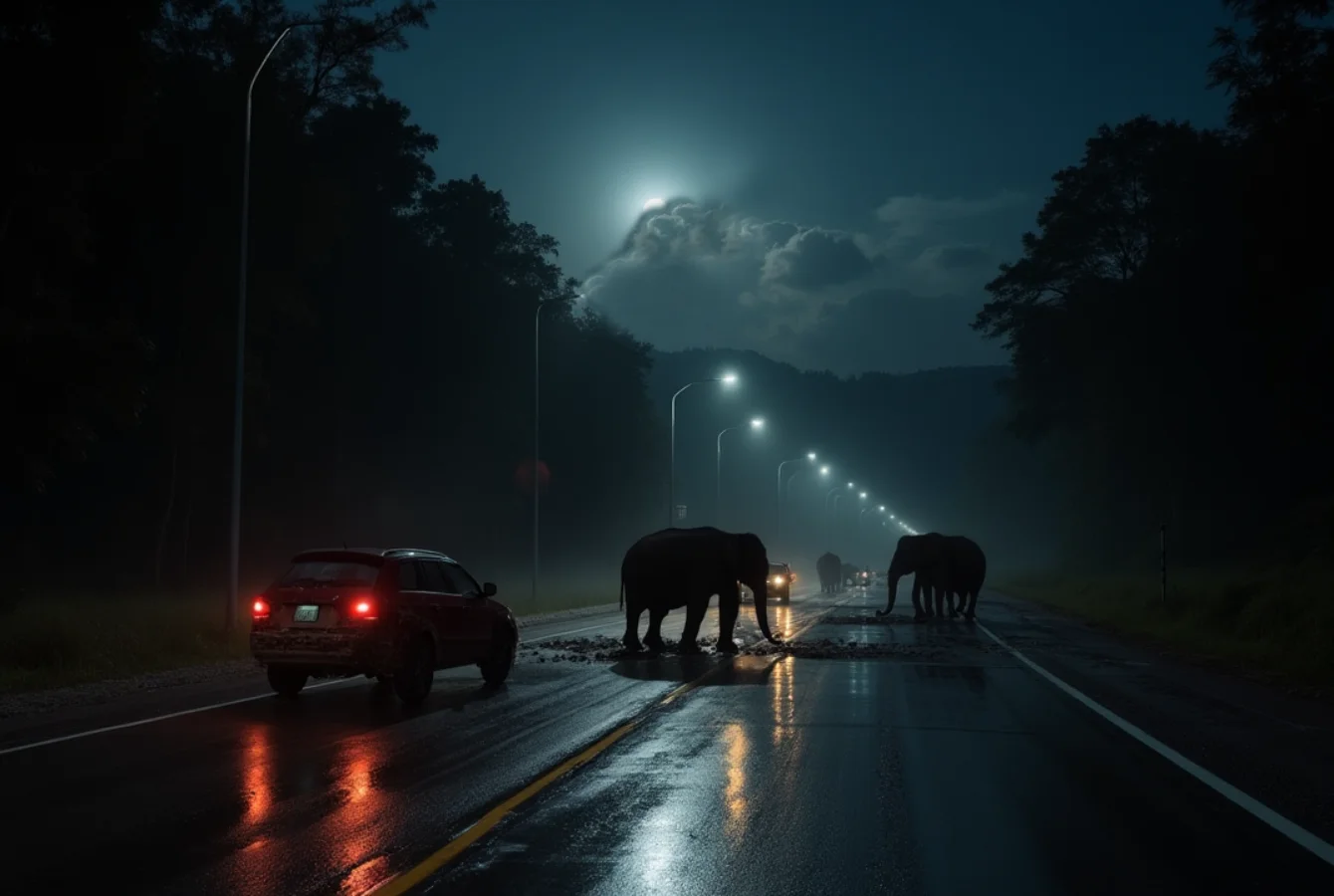In a stark reminder of the escalating tensions between humans and wildlife in Malaysia, a herd of wild elephants attacked and severely damaged a car on the Gerik-Jeli highway in Perak state on the night of May 20. The incident, believed to have been triggered by the sound of a car horn, has reignited calls for better protection of the country’s endangered wildlife and highlighted the growing frequency of human-elephant conflicts.
Details of the Incident
The driver of a Toyota Vios, a 39-year-old man heading to Gerik, encountered a herd of elephants crossing the highway near KM11. Following safety protocols, he stopped his vehicle and switched off the headlights to avoid startling the animals, according to Gerik police chief Zulkifli Mahmood. However, the situation escalated when the sound of a horn from another vehicle nearby agitated the herd. “The sound of the horn from another vehicle is believed to have caused three elephants to approach the car” said Mr. Zulkifli.
In a desperate bid for safety, the driver abandoned his vehicle and fled. While he escaped unharmed, his car sustained significant damage to the front and rear. Videos of the mangled white sedan quickly spread across social media, drawing public attention to the dangers of human-wildlife encounters in the region. The driver subsequently filed a police report and lodged a complaint with the Wildlife and National Parks Department (Perhilitan).
Perak Perhilitan chief Yusoff Shariff confirmed that the herd consisted of six elephants, including a tuskless adult male described as being in an “aggressive state.” This incident is not isolated, as the same highway was the site of a tragic accident earlier in May when an elephant calf was killed by a lorry, an event that stirred widespread sympathy and grief.
A Broader Crisis of Human-Wildlife Conflict
The Gerik-Jeli highway, cutting through dense forest areas in Perak, has become a hotspot for such encounters, reflecting a broader crisis across Malaysia. Natural Resources and Environmental Sustainability Minister Nik Nazmi Nik Ahmad recently revealed that over 66,000 human-wildlife conflict incidents were reported between 2020 and 2024, resulting in losses amounting to 46.5 million Malaysian Ringgit (US$10 million). These figures underscore the urgent need for solutions that balance human safety with wildlife conservation.
Human-elephant conflicts, in particular, pose a significant challenge. Elephants, often driven by habitat loss due to deforestation and urban expansion, venture into human territories in search of food and space. Highways like Gerik-Jeli, which bisect traditional elephant migration routes, exacerbate the risk of dangerous interactions. The emotional toll of these conflicts was poignantly captured earlier this month when a mother elephant was photographed standing vigil over her dead calf on the same highway on Mother’s Day, May 11, after it was struck by a lorry.
Community and Official Responses
The latest incident has amplified public calls for stronger measures to protect both wildlife and motorists. Social media platforms have buzzed with concern, with many Malaysians urging authorities to install warning signs, speed barriers, or even wildlife corridors to prevent such encounters. Others have criticized the lack of immediate response mechanisms for drivers caught in such situations.
Perhilitan and other government bodies face mounting pressure to address these conflicts. While efforts to relocate elephant herds or create protected corridors have been proposed in the past, implementation remains slow due to funding constraints and competing land-use priorities. Minister Nik Nazmi has acknowledged the complexity of the issue, noting that “human-elephant conflicts often involve lives and properties,” and has pledged to prioritize sustainable solutions.
Looking Ahead
As Malaysia grapples with rapid development and shrinking natural habitats, the clash between humans and wildlife is likely to intensify. The damaged sedan on the Gerik-Jeli highway serves as a powerful symbol of this ongoing struggle. For residents of Perak and beyond, each incident is a call to action—a reminder that coexistence requires not just empathy, but concrete policies to safeguard both human lives and the nation’s irreplaceable wildlife heritage. How authorities respond in the coming months may well determine whether such encounters remain tragic footnotes or become catalysts for meaningful change.
















